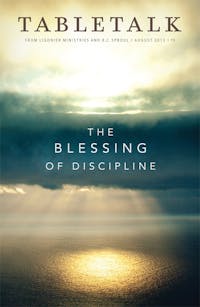
Request your free, three-month trial to Tabletalk magazine. You’ll receive the print issue monthly and gain immediate digital access to decades of archives. This trial is risk-free. No credit card required.
Try Tabletalk NowAlready receive Tabletalk magazine every month?
Verify your email address to gain unlimited access.
Mention the word church and a vast array of images enter the mind. A steepled building housing a congregation; a movement of God across the centuries and the world; “one, holy, catholic, and Apostolic”; “visible and invisible”; “militant and triumphant”; “local and universal.”
More images come from the Scriptures verbatim. The bride of Christ, the temple of the Holy Spirit, the branches connected to the life-giving vine of Christ. But a most provocative and instructive biblical image is “the body of Christ.” We are tempted, especially in the West, to view this body as successful, full of well-ordered, well-dressed, well-mannered people. But the Scriptures describe the church as a broken and weak body that, by God’s grace, confounds the world by also being a hopeful body.
THE CHURCH AS A BROKEN AND WEAK BODY
God hardly ever does things the way we might expect. In fact, God takes conventional wisdom and practices and turns them on their head. The whole nature of His redemptive work is “upside down.” Instead of using people of power and integrity or beauty and influence, God uses unknown people (Ruth), cowardly people (Gideon), deeply sinful people (David), and culturally insignificant people (the twelve disciples) to achieve His purposes. Why? So that He alone will receive the glory and the credit for what happens when He works through such surprising human vessels.
For people to understand the power of God working through His people, we must understand two things: first, brokenness forces us to see God as the ultimate and only reliable source of power; and second, God often breaks the very people He intends to use for His glory. Our culture focuses on outward appearance, beauty, physical and social power, self-sufficiency, and self-achievement. But our cultural pursuit of these is idolatry. We have made little gods of ourselves.
But Paul tells us that “God chose what is foolish . . . weak . . . low . . . despised . . . things that are not, to reduce to nothing things that are, so that no one might boast in the presence of God. He is the source of your life in Christ Jesus” (1 Cor. 1:27–31). In his second letter to the church at Corinth, Paul declared that his ministry was not from his own strength but from God’s. God says to Paul, “My power is made perfect in weakness” (2 Cor. 12:7–10). For Paul to boast in weakness seems absolutely insane to our modern sensibilities. To admit weakness is to admit defeat. But in God’s world, to admit weakness and defeat is necessary to accepting Him as the source of real power, purpose, and hope.
It is humbling to admit that we do not measure up, that we are not sufficient, that we are broken people. But the body of Christ must grasp this counter-intuitive truth in order to find and dwell in God’s power. We must have the courage to look at each other on Sunday, well-dressed, well-spoken, appearing to “have it all together,” and say, “We know better. We are broken people, desperately needing the power of God to come in our weakness.” This is where our friends who live with disability remind us by their presence who we really are.
THE CHURCH AS A HOPEFUL BODY
Hope recognizes that God works through weakness. Therefore, ministry to the broken, disabled, and suffering is not an obligation, but a privilege.
Paul unfolds this in 1 Corinthians 12:7–10. The body has some weaker and less presentable members. But in God’s providence, just as in our physical body, these members are “indispensable” in the body of Christ. What the world labels liabilities—those whose lives display weakness, brokenness, and neediness—God calls absolutely necessary for His church. Our culture seems to avoid and even reject those who are different due to their brokenness. God says to embrace and bring them close.
No one “makes it” alone. We are, in fact, interdependent upon God and one another. Disability helps us see that we are all broken and all part of the same body, needing to give and receive from one another. People with disabilities have much to contribute to the body of Christ—and when they are not present in our churches, the body is incomplete, lacking essential elements. Paul says that if one member suffers, then all members suffer (1 Cor. 12:26). As we identify with those who are more outwardly broken, as we embrace the metaphor of an interdependent body, we begin to see how we can “bear one another’s burdens” (Gal. 6:2). As we suffer and receive comfort from God and His people, we are also able to “comfort one another” with the same comfort we have received (2 Cor. 1:3–7).
The way people react to brokenness reveals their assumptions about the nature of the world. Many assume the world is the way it should be and that suffering is an anomaly to be avoided at all cost. But the broken and hopeful church says with conviction that the world is not as it should be. In fact, all creation has suffered the effects of sin and the fall, and groans for redemption and renewal. Because we admit that the world is broken, we believe with sure hope that there will be a re-making, a redress of injustice and brokenness.
Brokenness creates a longing in God’s children for all the brokenness and weakness to be changed and made right. And in this “making right” God will receive glory and worship.
